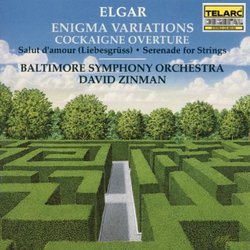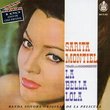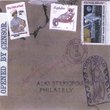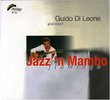| All Artists: Edward Elgar, David Zinman, Baltimore Symphony Orchestra Title: Elgar: Enigma Variations; Cockaigne Overture Members Wishing: 0 Total Copies: 0 Label: Telarc Release Date: 10/9/1989 Genre: Classical Styles: Chamber Music, Forms & Genres, Serenades & Divertimentos, Historical Periods, Romantic (c.1820-1910), Instruments, Strings, Symphonies Number of Discs: 1 SwapaCD Credits: 1 UPC: 089408019227 |
Search - Edward Elgar, David Zinman, Baltimore Symphony Orchestra :: Elgar: Enigma Variations; Cockaigne Overture
 | Edward Elgar, David Zinman, Baltimore Symphony Orchestra Elgar: Enigma Variations; Cockaigne Overture Genre: Classical
These are performances of such outstanding authority that even the British have praised them as among the very best available. The Baltimore Symphony plays with the utmost conviction and enthusiasm--Cockaigne really roc... more » |
Larger Image |
CD DetailsSynopsis
Amazon.com essential recording These are performances of such outstanding authority that even the British have praised them as among the very best available. The Baltimore Symphony plays with the utmost conviction and enthusiasm--Cockaigne really rocks, and the finale of Enigma, with a very well balanced optional organ part thrown in, is a sonic showcase. In fact, Telarc's sound is the best this music has ever been offered, with an especially impressive deep bass extension. There are many fine recordings of the Enigma Variations, but this one deserves an honored place in your collection. --David Hurwitz Similar CDs
|
CD ReviewsOf his Time samueljamescat | 01/16/2000 (5 out of 5 stars) "If I had to sum up the 20th Century in a short recording or a long one, I'd choose Ravel's "La Valse" and Walton's Violin Concerto. I don't have a recommendation for the Ravel, although when I lived in Dallas, it was the only thing I heard the Dallas Symphony play well. My choice for the Walton is Kyung Wha Chung's, with Previn and the LSO. Being human, I have the basic right to change my mind; stay posted.This morning, I put this recording on, while trying to read the "NY Times." Before long, the tears were streaming down my face. Elgar, perhaps more than any other composer, captures his own time, his own place, his own friends. Yes, this was a time before alienation had such a grip on us, before we moved all of the time, and we knew our neighbors. There is an elegance, that seems built into the genetic code. The Waltz Kings capture that for their own place and time but not quite like Elgar. Have we bred Edwardian ease out of our DNA or just buried it so deeply by historical events and behavior, so deep in the hard, hard ground that it is impervious to a back-hoe? For me, it takes something like "The Enigma Variations" to resurrect this very important quality of elegance.Yes, that quality is here, but the surprise is there, too. Whenever something, like war shatters the psyche, Elgar can tell us about it. Listen to Perlman play his violin concerto. Elgar's time was one where we could express indifference, and it could be a minor character foible. Now it is not hate but indifference, which is the very opposite of the love, we should celebrate on this holiday for Martin Luther King, Jr. It was a time, when joy was automatic and not hard work. I'm not Miniver Cheevy, but we need this music, and nobody plays it better, than on this disc." Excellent recording Mike G. | Cincinnati, Ohio | 07/29/2005 (4 out of 5 stars) "This recording has definitely grown on me. I own three recordings of this work. This was the first one that I purchased, and I later bought Gardiner/Vienna Philharmonic and Solti/Vienna Philharmonic. The last two soon eclipsed this recording, but it came back into favor when I began to realize its merits. In my Gardiner/VP veview, I pointed out that Gardiner brings a distinctly German feel to Elgar, and the interpretation seemed justified. The program here is almost identical to Gardiner's in regards to the type of selections. Zinman has 'Cockaigne', a concert overture, the short piece 'Love's Greeting', and the 'Serenade for Strings', while Gardiner has 'In the South' concert overture, 'Sospiri', a short adagio for strings and organ, and the 'Introduction and Allegro', also for strings. And of course both have Enigma. What I noticed when comparing these two albums was that Zinman's interpretation was as English sounding as Gardiner's was German. Each chose the perfect program to represent his own style (Zinman's pieces sound significantly more English), and the only overlap of interpretation happens in Enigma. In my opinion, the style could lean either way. Zinman conducts the Variations smoothly and rather as a whole (incidentally, there is only one 30-minute track here and not the usual 15 tracks). He emphasizes balance between the groups of instruments and is particularly keen on dynamic relationships. The Baltimore Symphony Orchestra is very stately, even in the very loud parts, and never overblown. They are still able to create large volumes of sound, but always in a controlled manner. Each recording has its slight problems (I gave all three CDs 4 stars each). I think the recording quality is excellent, and my problems with this recording are entirely subjective. The Serenade for Strings was a bit too lackluster for my taste, although here I should say that most other recordings are far worse and just turn this piece into "filler-mush". Zinman is not bad here, but I think if the pace were quickened in the first two movements it would help the flow a lot. As far as the Enigma Variations are concerned, Zinman takes about half the marked tempos, and the other half of the time he takes traditionally slower tempos. In my opinion, more movement could only benefit the performance here as well. I had my friends do a blind comparison of this recording of 'Nimrod' against Gardiner's and Solti's. They all came to the conclusion that in comparison Zinman's Nimrod was the least dynamic and impressive. I can't find fault with anything else though, so if you disagree with all of this tempo stuff, then enjoying the disc shouldn't be even the slightest problem." An Essential Recording! Barry Brownstein | 10/25/2006 (5 out of 5 stars) "Arguably the finest recording of Enigma Variations ever made. Listen and see if you can stay dry eyed during the Nimrod variation. In addition the recording has the benefits of great Telarc engineering.
When the recording was made, man for man the Baltimore Symphony could not match the talent of the world's great orchestras. Yet the finished recording perhaps exceeds the product of any orchestra that has ever recorded this music. How can this be? Playing orchestral music is a team effect. In this recording you hear absolute unanimity of purpose in making great music. Couple this with Zinman's interpretation and absolute precision in the orchestra's playing and the result is an essential recoding." |

 Track Listings (6) - Disc #1
Track Listings (6) - Disc #1



